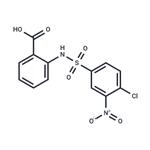2-[(4-chloro-3-nitrophenyl)sulphonyl]anthranilic acid manufacturers
- CTPI-2
-

- $66.00 / 100mg
-
2025-11-04
- CAS:68003-38-3
- Min. Order:
- Purity: 97.23%
- Supply Ability: 10g
|
| | 2-[(4-chloro-3-nitrophenyl)sulphonyl]anthranilic acid Basic information |
| Product Name: | 2-[(4-chloro-3-nitrophenyl)sulphonyl]anthranilic acid | | Synonyms: | 2-(4-Chloro-3-nitrophenylsulfonylamino)benzenecarboxylic acid;2-(4'-Chloro-3'-nitrobenzenesulfonamido)benzoic acid;Benzoic acid, 2-(((4-chloro-3-nitrophenyl)sulfonyl)amino)-;Einecs 268-121-3;2-[(4-chloro-3-nitrophenyl)sulphonyl]anthranilic acid;SLC25A1 inhibitor CTPI-2;macrophage,carrier,CTPI-2,NSCLC,transporter,glucose,steatohepatitis,CTPI 2,Mitochondrial Metabolism,steatosis,inflammatory,inhibit,citrate,Inhibitor,mitochondrial,CTPI2;2-(4-Chloro-3-nitrophenylsulfonamido)benzoic Acid | | CAS: | 68003-38-3 | | MF: | C13H9ClN2O6S | | MW: | 356.74 | | EINECS: | 268-121-3 | | Product Categories: | | | Mol File: | 68003-38-3.mol | ![2-[(4-chloro-3-nitrophenyl)sulphonyl]anthranilic acid Structure](CAS/GIF/68003-38-3.gif) |
| | 2-[(4-chloro-3-nitrophenyl)sulphonyl]anthranilic acid Chemical Properties |
| | 2-[(4-chloro-3-nitrophenyl)sulphonyl]anthranilic acid Usage And Synthesis |
| Uses | CTPI-2 is a third-generation mitochondrial citrate carrier SLC25A1 inhibitor with a KD of 3.5 μM. CTPI-2 inhibits glycolysis, PPARγ, and its downstream target the glucose transporter GLUT4. CTPI-2 halts salient alterations of NASH reverting steatosis, preventing the evolution to steatohepatitis, reducing inflammatory macrophage infiltration in the liver and adipose tissue, and starkly mitigating obesity induced by a high-fat diet. Antitumor activity[1][2]. | | Biological Activity | CTPI-2 is a selective mitochondrial citrate transporter (SLC25A1) inhibitor th at displays H1299 anti-proliferation activity in a SLC25A1-dependent manner (IC50 <10 μM). When compared with CTPI-1, CTPI-2 exhibits 20-fold higher target affinity (hSLC25A1 KD = 3.5 μM vs. 63.6 μM, respectively) and is ~1000-fold more potent against H1299 sphere-forming capacity. CTPI-2 inhibits mitochondrial respiration and formation of patient NSCLC tumors-derived CSCs spheres in cultures (10-50 μM), as well as suppresses the growth of patent-derived NSCLC exnografts in mice in vivo (28 mg/kg q.o.d. i.p.). | | in vivo | CTPI-2 is a unique regulator of glycolysis that limits the metabolic plasticity of cancer stem cells (CSCs). CTPI-2 (26 mg/kg; i.p.) inhibits tumor growth in in vivo models of non-small cell lung cancer (NSCLC)[1].
CTPI-2 (50 mg/kg; i.p.; alternate days for 12 weeks) completely averts weight gain in the prevention study and leads to significant weight loss in the reversion study[2].
CTPI-2 prevents steatohepatitis and normalizes glucose tolerance. CTPI-2 lowers the levels of circulating IL-6 while increasing anti-inflammatory IL-4 and IL-10 and also reduced the monocyte chemoattractant protein-1 and monokine-induced by interferon-γ that attract neutrophils and monocytes. CTPI-2 regulates the citrate pool, the lipogenic and the gluconeogenic pathways[2]. | Animal Model: | C57BL/6J mice (HFD-fed mice)[2] | | Dosage: | 50 mg/kg | | Administration: | Alternate days via the intraperitoneal route for 12 weeks | | Result: | Completely averted weight gain in the prevention study and led to significant weight loss in the reversion study.
|
| | References | [1] Tan M, et al. Inhibition of the mitochondrial citrate carrier, Slc25a1, reverts steatosis, glucose intolerance, and inflammation in preclinical models of NAFLD/NASH. Cell Death Differ. 2020;27(7):2143-2157. DOI:10.1038/s41418-020-0491-6
[2] Fernandez HR, et al. The mitochondrial citrate carrier, SLC25A1, drives stemness and therapy resistance in non-small cell lung cancer. Cell Death Differ. 2018;25(7):1239-1258. DOI:10.1038/s41418-018-0101-z |
| | 2-[(4-chloro-3-nitrophenyl)sulphonyl]anthranilic acid Preparation Products And Raw materials |
|